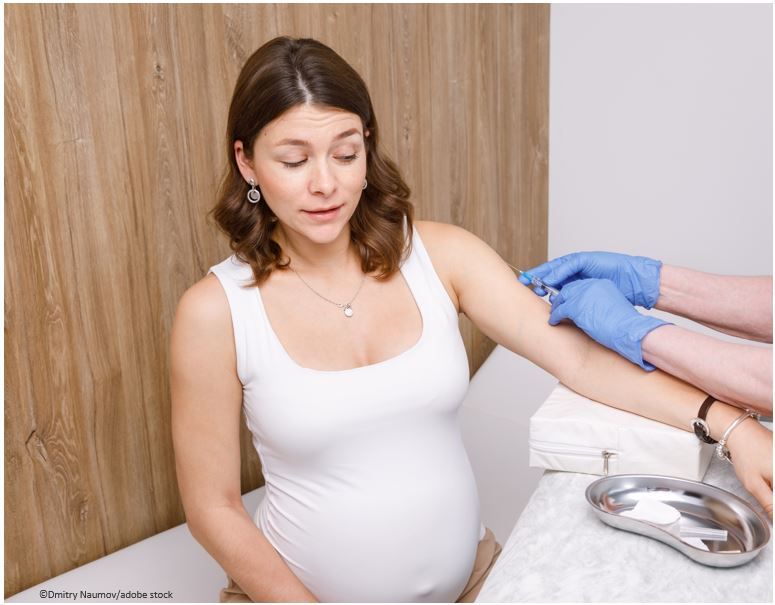- Clinical Technology
- Adult Immunization
- Hepatology
- Pediatric Immunization
- Screening
- Psychiatry
- Allergy
- Women's Health
- Cardiology
- Pediatrics
- Dermatology
- Endocrinology
- Pain Management
- Gastroenterology
- Infectious Disease
- Obesity Medicine
- Rheumatology
- Nephrology
- Neurology
- Pulmonology
FDA Updates Flublok Label with Safety Data for Pregnant Individuals
The safety data used to update the Flublok label is from a study of more than 48 000 pregnant women across multiple flu seasons, according to Sanofi.
©Dmitry Naumov/stock.adobe.com

The FDA updated the product label for influenza vaccine Flublok (Recombinant flu vaccine; Sanofi) to incorporate data from a large new safety study of more than 48 000 pregnant people aged 18 years and older, across multiple flu seasons, according to a news release from Sanofi.1
The update announcement, the company said, should allow time for women to receive the annual flu vaccine, which the CDC recommends be given to pregnant women ideally before the end of October.2 The CDC, the Advisory Committee on Immunization Practices, and the American College of Obstetricians and Gynecologists (ACOG) recommend recombinant or inactivated influenza vaccine for women who are or will become pregnant during the flu season.2,3
The post-licensure, observational, retrospective safety surveillance study, published in the American Journal of Obstetrics and Gynecology Global Reports, included 48 781 pregnant individuals including those with chronic conditions.
Participants received either Flublok Quadrivalent or a comparator influenza vaccine during the 2018 to 2019 and 2019 to 2020 Northern Hemisphere influenza seasons, with shots given within 28 days before pregnancy or during pregnancy.1
OUTCOMES
Investigators reported no increased risk of adverse pregnancy, birth, or neonatal outcomes among women who received Flublok compared to those taking the comparator vaccine. Eclampsia and preeclampsia were the most frequently reported pregnancy outcomes for both vaccines, at a rate of 8.4% in both groups, according to the statement.
Additional outcomes included preterm labor in 3.6% of the Flublok group and 3.5% of the comparator group, spontaneous abortion in 3.1% and 3%, respectively, fetal anomalies detected during pregnancy in 2.4% of both groups, placental abruption in 0.8% and 0.7%, respectively, and stillbirth or fetal death in 0.4% and 0.5%, respectively.
Among the reported birth and neonatal/infant outcomes, small for gestational age was the most common, with rates of 8.8% and 8.7% in the Flublok and comparator vaccine groups, respectively. This was followed by major congenital anomalies at 7.7% in both groups, preterm birth at 7.4% and 7.5%, respectively, low birth weight at 5.9% and 5.8%, respectively, and failure to thrive at 1% and 1.1%, respectively.
Safety results from the study indicated a profile consistent with standard-dose influenza vaccine and with pregnancy-related outcomes in the general population, Sanofi said.
Risks of Influenza During Pregnancy
The risks of severe illness and complications related to influenza are increased in pregnant women and particularly during the second and third trimesters, according to the CDC.2 For postpartum women, the risks remain elevated for up to 2 weeks after birth.2 ACOG recommends full vaccination during pregnancy as soon as the vaccine becomes available during flu season to help reduce the risk for adverse pregnancy outcomes including preterm labor and premature delivery.3 Vaccination during pregnancy also protects the fetus via transferred antibodies that reduce the risk of a neonate contracting flu during the first 6 months of life, the period before the CDC's recommended age of 6 months to initiate seasonal vaccination.2
The standard safety information for Flublok pertains to pregnant individuals as well, according to Sanofi. The vaccine should not be given to any person who has had severe allergic reactions to any component of the vaccine. Administration should also be avoided in environments where there is a risk of injury from fainting. The immune response to Flublok may be attenuated in individuals with compromised immunity.1
The most common adverse events noted among adults aged 18 to 64 years who received Flublok include pain at administration site, headache, tiredness, and myalgias. In those aged 65 years and older, administration site pain, tiredness, and headache are the most common.
